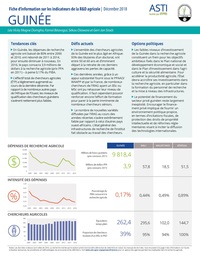Authors:
Léa Vicky Magne Domgho, Famoï Béavogui, Sékou Diawara and Gert-Jan Stads
Year:
2018
Publisher
International Food Policy Research Institute and Institut de Recherche Agronomique de Guinée.
Back to:
Key trends
- Agricultural research spending in Guinea fell by 80 percent during 2000–2010, rebounded temporarily during 2011–2014, but has continued to fall since. In 2016, the country invested $3.9 million in agricultural research (in 2011 PPP prices), which represents just 0.17 percent of AgGDP.
- Guinea's total number of FTE agricultural researchers has remained fairly constant over the past decade. Compared to many other countries in West Africa, Guinean researchers hold much lower average qualification levels.
Current challenges
- Guinea has the oldest pool of agricultural researchers of any African country: 93 percent of its PhD-qualified researchers are in their 50s or 60s, and large-scale capacity losses due to retirement are imminent.
- Substantial support from WAAPP and France has allowed IRAG to upgrade the qualification levels of many of its BSc-qualified researchers to the MSc level in recent years. However, much larger training investment is needed to offset the impending departures of many senior researchers.
- The number of new varieties released by IRAG in recent years is extremely low compared with other countries in West Africa. The institute’s overall rundown state of research infrastructure makes it challenging for researchers to work effectively.
Policy options
- Guinea's low investment levels in agricultural research are in stark contrast with the ambitious goals set in the government's National Economic and Social Development Plan and Agricultural and Food Security Investment Plan. To accelerate agricultural productivity, the government will need to increase its investment in agricultural research, particularly in research staff training and infrastructure upgrades.
- The private sector funding potential remains largely untapped in Guinea. Cultivating private funding involves providing a more enabling policy environment in terms of tax incentives, protection of intellectual property rights, and regulatory reforms to encourage the spill-in of international technologies.

